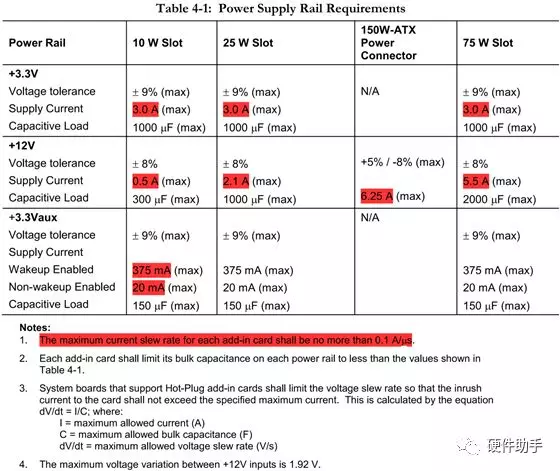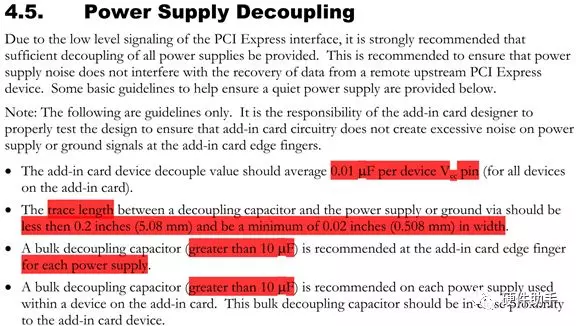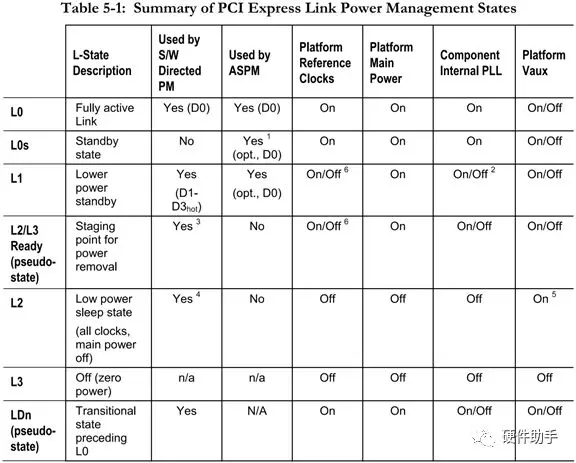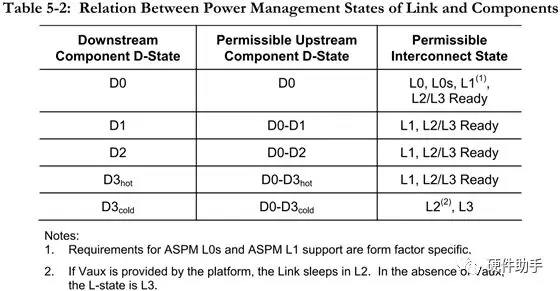本片主要介绍PCIe总线的电源管理,主要包括不同板卡的功耗、板卡的能耗等级等。
1、功耗等级
根据《PCIx系列之“PCIe总线信号介绍”》,PCIe接口的电源包括+12V、+3.3V、+3.3Vaux三种。根据功耗的不同,三种电压的供电能力不同,PCIe卡可以分为以下几种:
10W,直接通过金手指提供;
25W,直接通过金手指提供;
75W,直接通过金手指提供;
150W,需同时通过金手指和2×3Connector提供;
225W,需同时通过金手指和2×4Connector提供;
300W,需同时通过金手指和2×3Connector和2×4 Connector提供;



2、电源去耦电容要求
PCIe接口的去耦电容、bulk电容要求如下:

3、电源管理
PCIe卡和RC建立连接后,Link power management states有如下几种:
L0 – Active state. 是工作状态,所有的PCIe操作都可以进行。
L0s – A low resume latency, energy saving “standby” state. 是节能的待机状态,但是能很快恢复到工作状态。
L1 – Higher latency, lower power “standby” state. 是低能耗的待机状态,需要比L0s更多的时间恢复到工作状态。
L2/L3 Ready – Staging point for L2 or L3.
L2 – Auxiliary-powered Link, deep-energy-saving state. 使用辅助供电,深度节能状态,实现上面属于可选的状态。
L3 – Link Off state. 是完全关闭的状态。
LDn – A transitional Link Down pseudo-state prior to L0.

Device Power Management States有如下几种:
D0 State
D0 uninitialized state
D0 active state
D1 State
D2 State
D3 State
D3 hot state
D3 cold state

每一种尺寸的卡,在上电时其默认最大功耗是有限制的,可以通过软件配置更高的功率。每种尺寸的卡的默认功率为:
A x1 standard height, half-length card is limited to a 10 W maximum power dissipation.
A x1 low profile card is limited to a 10 W maximum power dissipation.
A x1 standard height, full-length card is limited to a 10 W maximum power dissipation at initial power up. When the card is configured for high power, by default, it must not exceed a 25 W maximum power dissipation oroptionally it must not exceed a 75 W maximum power dissipation.
A x4/x8 or a x16 standard height or low profile card is limited to a25 W maximum power dissipation at initial power up. When a card is configured for high power, it must not exceed a 75 W maximum power dissipation.
文章转载自: 硬件助手





